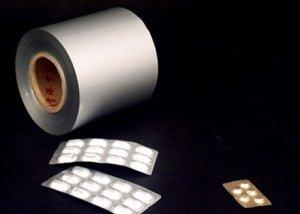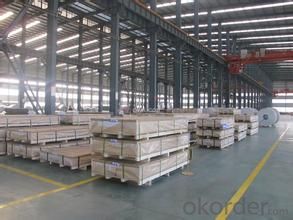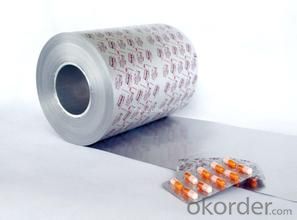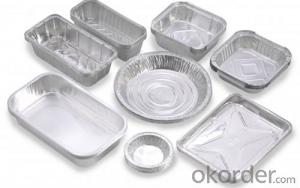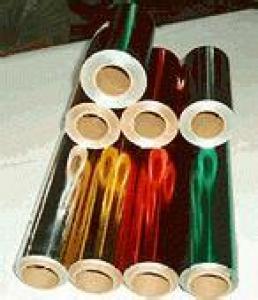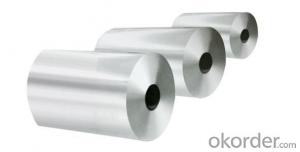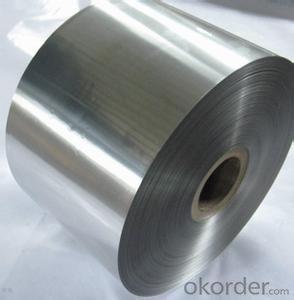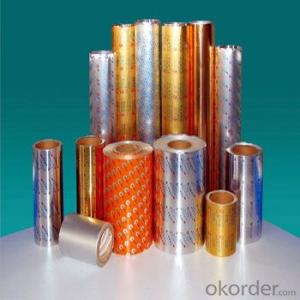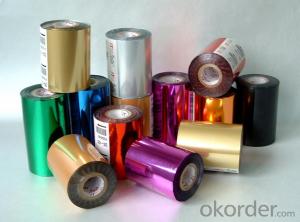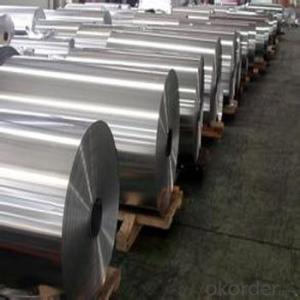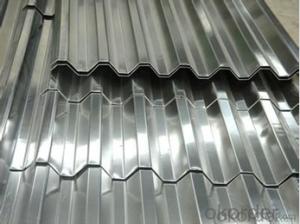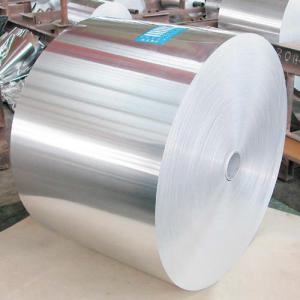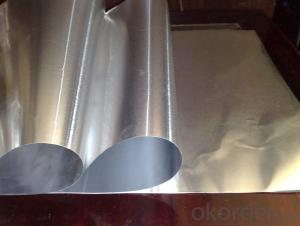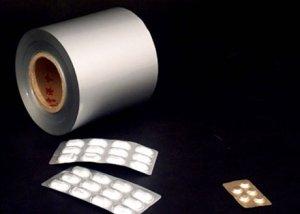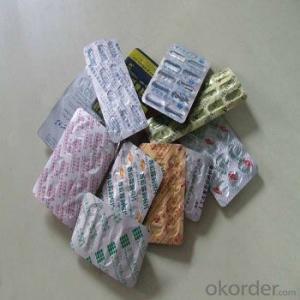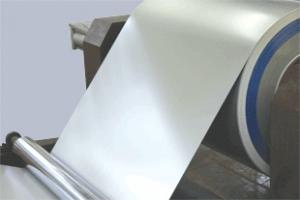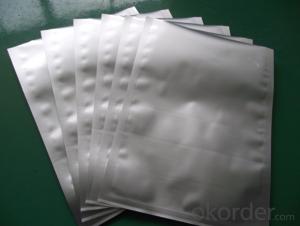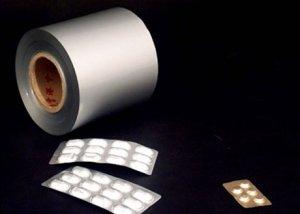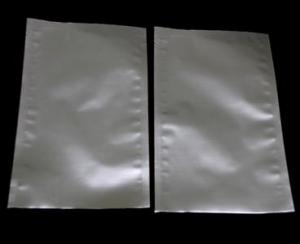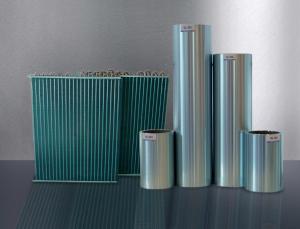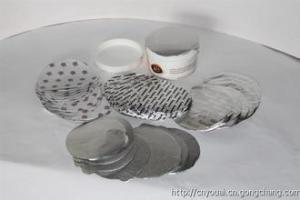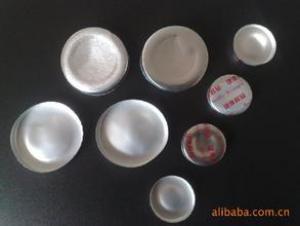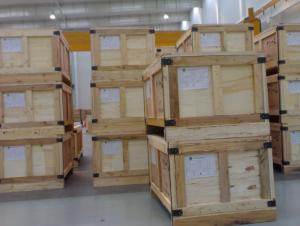Aluminum Tin Foil Pharmaceutical Lacquered Aluminium Foils
- Loading Port:
- Shanghai
- Payment Terms:
- TT OR LC
- Min Order Qty:
- 8 m.t.
- Supply Capability:
- 800 m.t./month
OKorder Service Pledge
OKorder Financial Service
You Might Also Like
Aluminium is theoretically 100% recyclable without any loss of its natural qualities. According to the International Resource Panel's Metal Stocks in Society report, the global per capita stock of aluminium in use in society (i.e. in cars, buildings, electronics etc.) is 80 kg (180 lb). Much of this is in more-developed countries (350–500 kg (770–1,100 lb) per capita) rather than less-developed countries (35 kg (77 lb) per capita). Knowing the per capita stocks and their approximate lifespans is important for planning recycling.
Application: PTP foil, cold-forming foil, aalu-alu foil
Alloy: 8006/ 8011/ 8079
Temper: H18/O
Thickness& Tolerance: 0.02mm-0.09mm(±6%)
Width& Tolerance: 200mm-1650mm(±1mm)
Lacquer:HSL for PVC
Primer: Primer for printing
Standard: GB/T31988/ASTM-B209/EN546
SURFACE QUALITY: GOOD APPEARANCE WITH NO-CRACK AND WELL-DISTRIBUTE GRAIN.
BUILD UP: TIGHT SLIT EDGES FREE FROM CRACKS, LAYER TO LAYER SHIFT NOT MORE THAN 2MM.
PROFILE: -0/+1%
FLATNESS: MILL FLATNESS COIL HAVING EDGE WAVINESS RATHER THAN CENTER BUCKLES SHALL BE ACCEPTABLE.
ROLLING PERFORMANCE: RE-ROLLABLE TO THE FINAL DESIRES GAUGES
Aluminium foil (or aluminum foil) is aluminium prepared in thin metal leaves with a thickness less than 0.2 millimetres (8 mils); thinner gauges down to 6 micrometres (0.24 mils) are also commonly used.In the United States, foils are commonly gauged in thousandths of an inch or mils. Standard household foil is typically 0.016 mm (0.63 mils) thick, and heavy duty household foil is typically 0.024 mm (0.94 mils). Thefoil is pliable, and can be readily bent or wrapped around objects. Thin foils are fragile and are sometimeslaminated to other materials such as plastics or paper to make them more useful. Aluminium foil supplantedtin foil in the mid 20th century.
Annual production of aluminium foil was approximately 800,000 tonnes (880,000 tons) in Europe and 600,000 tonnes (660,000 tons) in the U.S. in 2003.
Approximately 75% of aluminium foil is used for packaging offoods, cosmetics, and chemical products, and 25% used for industrial applications (e.g. thermal insulation, cables and electronics).
- Q: I am looking for a solid color green gold leaf, but so far have seen only the standard colors (gold, silver) and a few that are colored but have a Kaleidoscope effectDo they make leaf in a variety of colors? Is it called something else?
- Knit it out of 100% wool and felt itYou don't want links so I'll tell you to Google felted bags instead.
- Q: Currently have 16quot; stock aluminum rims, 4x4 TRD vehicle package
- Way back at the dawn of time, we actually used to line pans with paper cut from a brown paper bag, or you could use the brown paper used to wrap packages to mail or the so-called craft paperI would make sure the paper was clean and probably give it a light coat of greaseBetween foil and waxed paper: foil is a possibility, but you may need to adjust the temperature and cooking timeNEVER use waxed paper - we used it in the last century to substitute for plastic sandwich bags - wax keeps the moisture and filling inside your sandwich / cookiesGood luck!
- Q: How long do you cook an ear of corn in the oven wraped in foil?
- It is a simple process to bake corn in the ovenPreheat the oven to 425°F (220°C)Remove the husk and silks from the cornRub the ears with a little butter, and salt and pepper them judiciouslyWrap the ears in aluminum foilPlace on a rack in the oven and cook for 20 minutesIf they're big, heavy ears — what people used to call roasting corn — it may take as long as 30 minutes(If there is some chance of melted butter escaping from your aluminum foil and causing your kitchen to fill with smoke, place a jelly-roll pan or some other flat pan with sides on a lower rack in the oven to catch the drips.)
- Q: Aluminum foil burns on an alcohol lamp flame but melts, but does not drip. Why?
- So, three two aluminum oxide and magnesium oxide as refractory materials, the reason is not dropped is the formation of a net shaped structure, the oxide douzhu.
- Q: how to polish aluminium on motorcycle?
- Would help some, depends on the air flow as wellInstalling a power fan to pull out hot air will helpin some homes I have seen people blow fiberglass several inches deepBlocks air flow and house sweats and problems startHow good are your windows and doors? insulated drapes will help.
- Q: I have been having some problems storing my vegetables in my fridgeI live in an apartment and my fridge is rather smallAdditionally the fridge does not have a crisper drawer, rather just some storage drawersDoes anyone have advice on how to store my vegetables in the fridge? Should I use a paper bag, a cheese cloth? Does a plastic bag have too much moisture and promote mold?
- It really depends on the vegetableOne vegetable that typically goes bad in the fridge is celeryTo make it last longer, you should take it out of the plastic that it comes in, wrap it in aluminum foil, and then put it back in the plastic bagIt will last 3 times longer if you store it that wayRemoving carrot and beet tops will help prevent wiltingFor corn, take the corn out of any plastic bag, and just leave them unhusked in the refrigeratorMost vegetables will need a plastic bag if they are not stored in the crisperThe reason the crisper works is because there is less circulation of the air, so the vegetables avoid wilting longer.
- Q: I've heard that I shouldn't keep a hot glue gun on its side because the glue could drip into an area that would be lethal.If the gun hasn't been in use for many hours, and the glue inside has dried, can I store it sideways?
- When it's hot and you're using it you should put some thing under neath so the glue doesn't melt any thing or so the tip of the gun doesn't burn any thingI often put a few layers of aluminum foil under the glue gun and I don't have any issues with it melting or burning any thingIf the glue has dried and cooled you can store it with the glue in itI've done this for many years and haven't had any issuesOnce it's cooled off it shouldn't harm any thingYou can also re heat it with the glue in itIf you leave it standing while it's hot some times the glue can drip outWhen it's cooled down you can store it how ever you like.
- Q: after school i forgot to go back into my homeroom and get a dictionary.i need someone to look in the dictionary for these words and tell me the guide words for the words 11- 20.11opportunity12aluminum13transfusion14tulip15cellulose 16luminous 17rescue 18ridicule 19tribute 20mutinyGuide words- a word printed at the top of the page of a dictionary or other reference book to indicate the first and last word on that page
- eggs, flour, sugar, milk, cream, corn meal, yeast, cherry pie filling, blueberry pie filling, lemon pie filling, pumpkin pie filling, dark cholocate, light chocolate, brandy, bourbon, whipped cream, pecans, brown sugar, light karo syrup, dark karo syrup, baking powder, frosting mix - chocolate, vanilla, lemon, peppermint ice cream, food colorings, butterscotch flavoring, Raspbery sorbet, liquorice
- Q: Foil type: 3003 and 8011, how can distinguish between the more detailed the better?
- If the state is H243003 less than 8011 elongation of aluminum foil, but 3003 high tensile strength. Some foreign products with more than 3003 brands of aluminum foil.
- Q: how long do you think it would take lemon juice to eat through a sheet of tin foil?
- Aluminum foil? I've had lasagna and rigatoni both eat through a baking pan (you know, those cheap foil ones for turkey that are like a nickel around thanksgiving)It only took like 3 days in the fridgeI don't think tomatoes are as acidic as lemons and the pan was heavier than foil (but not that much more)So I'm gonna say about 3 days.
Send your message to us
Aluminum Tin Foil Pharmaceutical Lacquered Aluminium Foils
- Loading Port:
- Shanghai
- Payment Terms:
- TT OR LC
- Min Order Qty:
- 8 m.t.
- Supply Capability:
- 800 m.t./month
OKorder Service Pledge
OKorder Financial Service
Similar products
Hot products
Hot Searches
Related keywords
